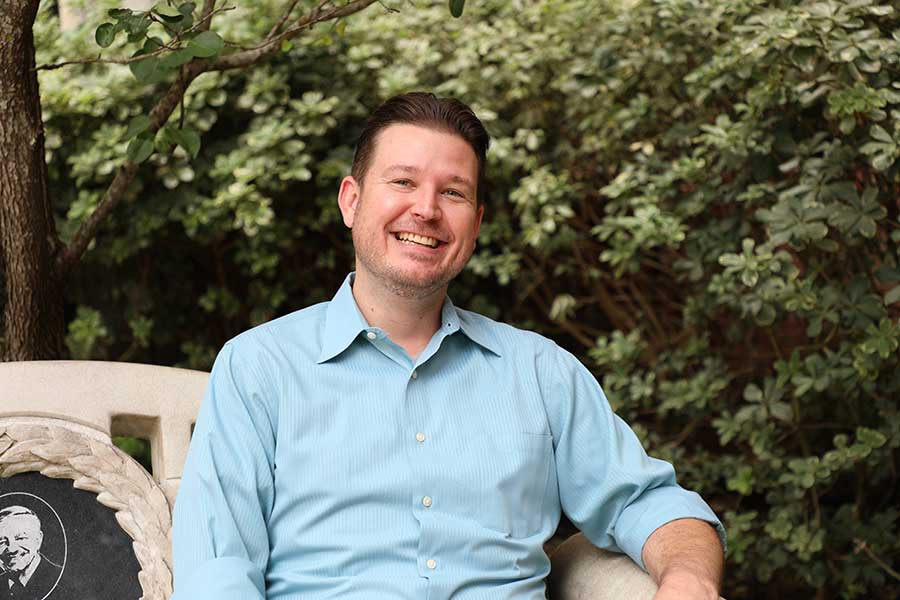FSU psychologist elected as a fellow in prestigious American Psychological Association

A Florida State University professor is being honored by the most prestigious psychological institution in the country on the heels of receiving a major National Institutes of Health grant to expand his research on the treatment of pediatric ADHD.
Associate professor of psychology Michael Kofler has been named a fellow of the American Psychological Association. The American Psychological Association is the leading scientific and professional organization representing psychology in the country with more than 133,000 members. Fellow status is granted only to members whose work has had an impact on the field of psychology beyond the local, state or regional level. Kofler is the seventh APA fellow from FSU.
“I was beyond excited and humbled to learn I was elected a fellow, especially considering this is the first year I was eligible to earn this title,” Kofler said. “Florida State has one of the strongest, most productive departments of psychology in the world, and I think this is just additional evidence of that.”
Kofler, who is a licensed psychologist and the founder of FSU’s Children’s Learning Clinic, focuses on improving long-term outcomes for children with attention-deficit/hyperactivity disorder, or ADHD. His work centers on strengthening the brain’s executive functions, which assist in planning and guiding behavior. His research has shown that unlike other gold-standard treatments for ADHD, central executive training creates long-lasting benefits in children affected by ADHD by targeting the source of the symptoms rather than the outward expressions.
In late 2021, this central executive training platform was patented to improve working memory deficits, instead of short-term memory deficits, in children with ADHD.
“My interest in this research began before graduate school when I worked in a residential psychiatric facility for adolescents,” Kofler said. “There was a very structured behavioral program in place that helped the kids show great improvements, but when we sent them home and the behavioral program wasn’t in place, parents reported the same behaviors that brought them to the facility in the first place.”
The NIH recently awarded Kofler a combined $9 million to expand his work in pediatric ADHD.
Kofler and his graduate mentor, University of Central Florida psychology Professor Mark Rapport, came to the conclusion that perhaps diagnostic manuals were wrong about ADHD — instead of attention deficits, hyperactivity, and impulsivity being the core causes of ADHD, these could be the outward effects. He then began investigating different cognitive processes and discovered that most cases of ADHD stem from difficulties in working memory, which led to the development of the Children’s Learning Clinic and Kofler’s central executive training therapy.
Since its inception in 2015, the FSU Children’s Learning Clinic has provided more than 300 no-cost evaluations and diagnoses of children’s disorders for local families and has published more than 100 peer-reviewed scientific studies on ADHD and related difficulties.
“Dr. Kofler is a rising star in the field of clinical psychology,” said Brad Schmidt, chair of the Department of Psychology. “He’s doing innovative and important work that’s getting the wide recognition it deserves. He’s chosen to focus on a problem that is very difficult to treat — his work is crucial in providing relief to those affected by attentional difficulties, both children and their families.”
Currently, the lab uses arcade-style video games to target different components of central executive functions associated with working memory that are translating into improvements in learning, impulse control, planning, organizing and emotion regulation. Grants are allowing these techniques to be expanded from the 8-13 years age range to children as young as 4-years-old and for these treatments to be combined with existing behavior management-based parent training.
Kofler, who earned his doctorate at UCF in 2010 before coming to Tallahassee in 2014, is also a member of the International Neuropsychological Society, Association for Behavioral and Cognitive Therapies, Society for Digital Mental Health, and the International Society for Research in Child and Adolescent Psychopathology. In addition, he serves as a consulting editor for the journal Child Neuropsychology, is a member of the editorial board for the journal Research in Child and Adolescent Psychopathology, and was awarded the young scientist research award from the national ADHD advocacy group Children and Adults with Attention-Deficit/Hyperactivity Disorder, or CHADD in 2012.
